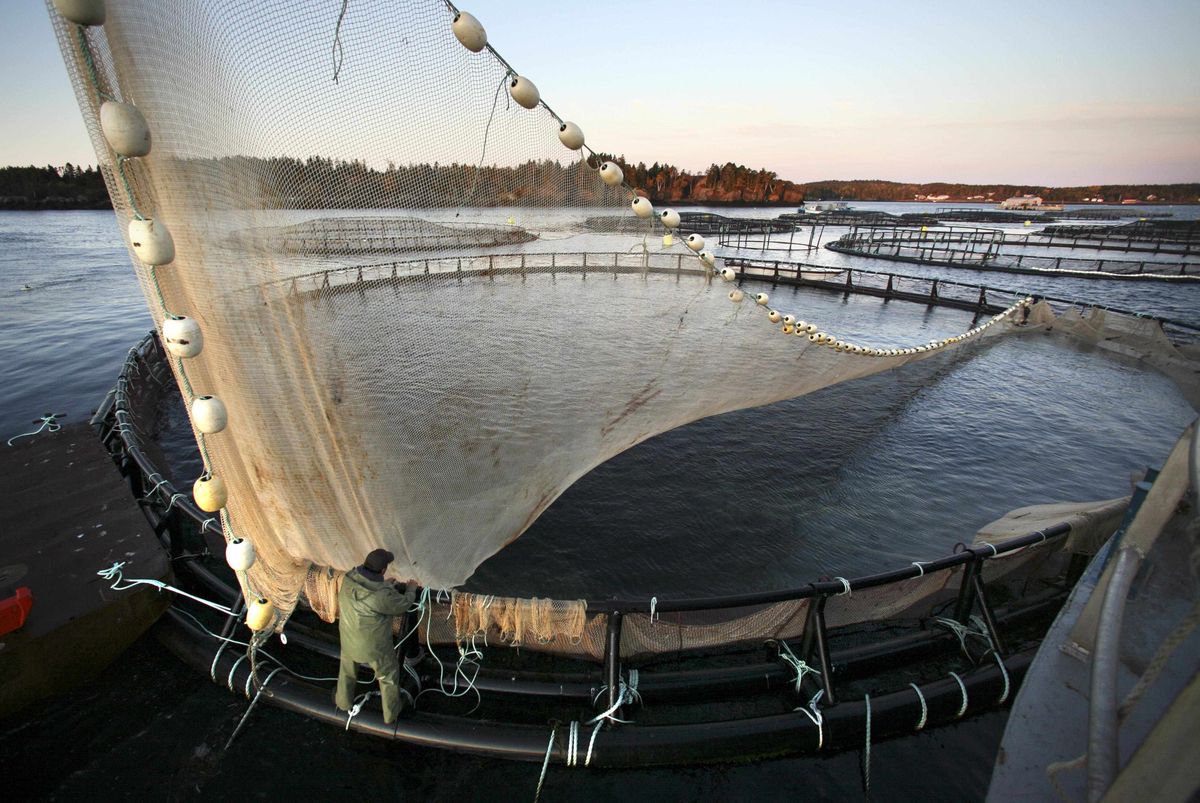Salmon comeback
After several troubled years, Maine’s farming industry is on the rise

EASTPORT, Maine – It’s feeding time at Cobscook Bay’s Broad Cove, and the 25,000 salmon are hungry.
Their twice-daily dinner arrives on a barge loaded with 80 tons of feed pellets, which deliver the food through a 3-inch plastic pipe. In a matter of minutes, an underwater camera shows the pellets draw no more takers: The salmon are satisfied.
The centralized, automated feeding system is among changes now in place as Maine’s salmon farming industry mounts a vigorous comeback five years after it collapsed when the three biggest players sold off their operations and left the state.
The new owner is Cooke Aquaculture Inc., a family-owned business across the border in Blacks Harbour, New Brunswick, that has invested $60 million to restore production to its former peak levels. It also plans to put an idle processing plant back in operation next year.
Salmon farming was a bright spot in Maine’s economy before a series of setbacks set the stage for the industry’s downfall.
The federal government’s decision to list wild Atlantic salmon as endangered on eight Maine rivers led to tougher regulations. A disease outbreak forced the destruction of large numbers of fish and a federal judge fined two Maine producers for fouling the sea floor with excess feed, medications, feces and other pollutants.
“It was kind of like a perfect storm,” said George Lapointe, commissioner of the state Department of Marine Resources.
Dramatic changes in the economics of the business added to the woes of salmon farmers, Lapointe recalled. Prices tumbled from $5 a pound to less than $2 for a time, he said.
Today, industry leaders say the industry is healthier, more efficient and more in tune with the environment. And it’s looking to expand.
Maine and Washington are the only states where salmon is farmed, but their combined output is dwarfed by that of major producers such as Chile, Norway, Scotland and Canada. In the U.S., catfish holds sway as the top aquaculture species, outstripping salmon and various types of shellfish.
Maine’s 2008 salmon harvest is likely to total more than 20 million pounds, the highest since production peaked at 36 million pounds in 2000 and 29 million a year later, said Sebastian Belle, executive director of the Maine Aquaculture Association.
Cooke Aquaculture has adopted a number of changes, including preventing the growth of pathogens that cause deadly illness in fish by allowing saltwater pens to lie fallow after fish are harvested.
The company also has upgraded the netting at its pens to keep predators such as seals and birds from getting in and the salmon from getting out.
Escapes have been a major concern because pen-raised salmon could spread disease to their wild cousins and even interbreed with them, fouling up their genetic makeup.
Environmentalists who fought the aquaculture operators in court remain skeptical about Cooke Aquaculture’s operations, despite its improvements.
Raising huge numbers of fish in pens creates a breeding ground for pests and disease, discharges large amounts of waste and poses a threat to wild salmon, they say.
“Basically it’s hard to trust this industry, and whether they should even be doing what they’re doing is kind of a bigger question,” said Josh Kratka, an attorney with the National Environmental Law Center.
But with the collapse of groundfishing, aquaculture remains one of the few activities aside from lobstering that provides jobs along eastern Maine’s waterfronts.
David Morang, who manages Cooke Aquaculture’s operations in Eastport and Lubec, remembers how he faced the prospect of having to leave Maine at age 50 when another aquaculture operation, Heritage Salmon, went under in 2005.
There was little hope for the failed industry until the Cooke family moved in, he said, increasing the number of salmon in Maine pens from 300,000 in 2005 to 3 million a year later.
Cooke now processes its Maine salmon in St. George, New Brunswick. By January it plans to reopen the 28,000-square-foot plant in Machiasport that it inherited when it bought another rival, Atlantic Salmon.